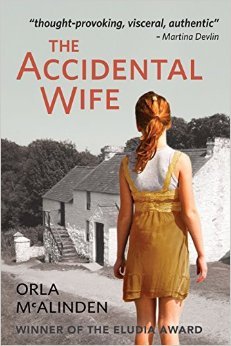Review| The Accidental Wife by Orla McAlinden
Whether it be a young child going out to lunch with her aunt with the strange accent, or a farmer greeted in the yard by men in balaclavas looking for money, McAlinden’s stories find the tension and conflict in any situation. Though there are situations which readers of Irish fiction may be well acquainted with, such as the family dinner table and other domestic staples, McAlinden charts new and unexpected territory in her collection.

The collection is published by Sowilo Press, following McAlinden’s winning of the Eludia Award, which seeks to recognise first book length projects produced by women over forty. Both the press and award are the work of Philadelphia based organisation Hidden River Arts, thought the collection is set in Northern Ireland. The collection is ambitious. The stories explore religious and class divides, as they express themselves in situations which seem instantly familiar. McAlinden also presents the reader with a spectrum of human emotion. The collection spans generations of the same families, with characters reappearing throughout. Historically, suffering is a prominent theme in the Irish short story. McAlinden’s narrators are often bitter, resentful or resigned, yet the reader is offered both sides of the story. We are able to chart the course of these relationships as McAlinden’s characters fall in and out of love.
The prose is conversational, and the dialogue is steeped in the local dialect. Though at times it feels like a turn of phrase too many, it is engaging and addictive. It is often the quick wits of McAlinden’s characters upon which the stories turn. We also see how the slightest inflections of accent and vocabulary can reveal identity, and even intention, in a community where even masked men can’t avoid being recognised. It is also the speech of the characters which give the stories their sense of place. Even when characters find themselves abroad, they cannot seem to shake the tell tale signs of their origins.
The historical import of the collection is reinforced as certain stories take place in the midst of instantly recognisable events. A teacher takes her child to school during the general strike and protest, a talented young farmer’s son with great business acumen is killed when a department store is bombed. Rather than studiously dramatising events which would otherwise be at a remove, McAlinden shows us flesh and blood individuals caught in circumstances outside their control.
The collection is made up of short stories and even shorter flash fiction style pieces. This episodic quality gives the collection a sense of immediacy. Though occasionally it feels like certain characters or situations need more exposition, or that several short pieces could fit together into a larger narrative. That said, when taken as a whole, the collection reads as an expansive portrait of a whole community.
Overall it is this sense of expansive insight which distinguishes the collection. The ease with which McAlinden inhabits a wide range of narrative voices speaks to her talent and ear. That this is only her first collection hints at further development of a new and exciting voice in Irish fiction.
Featured Image Source

